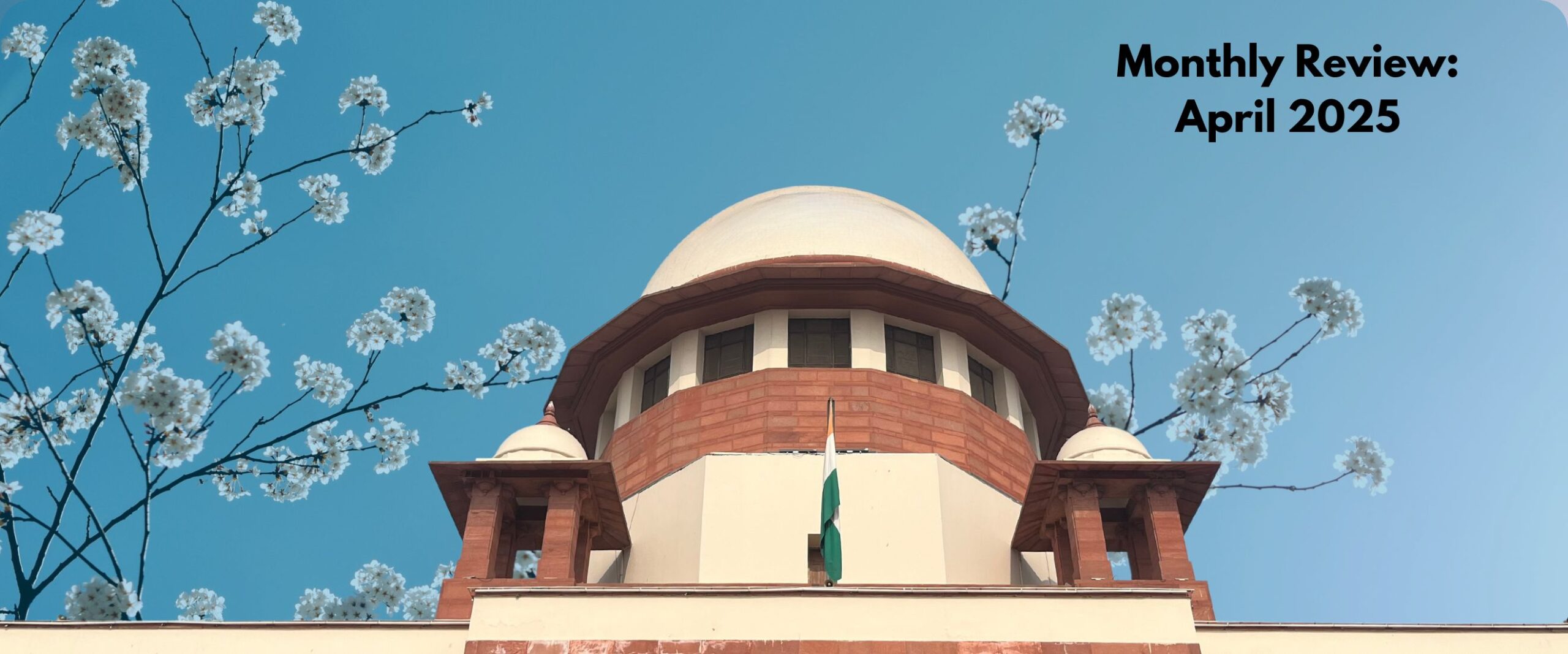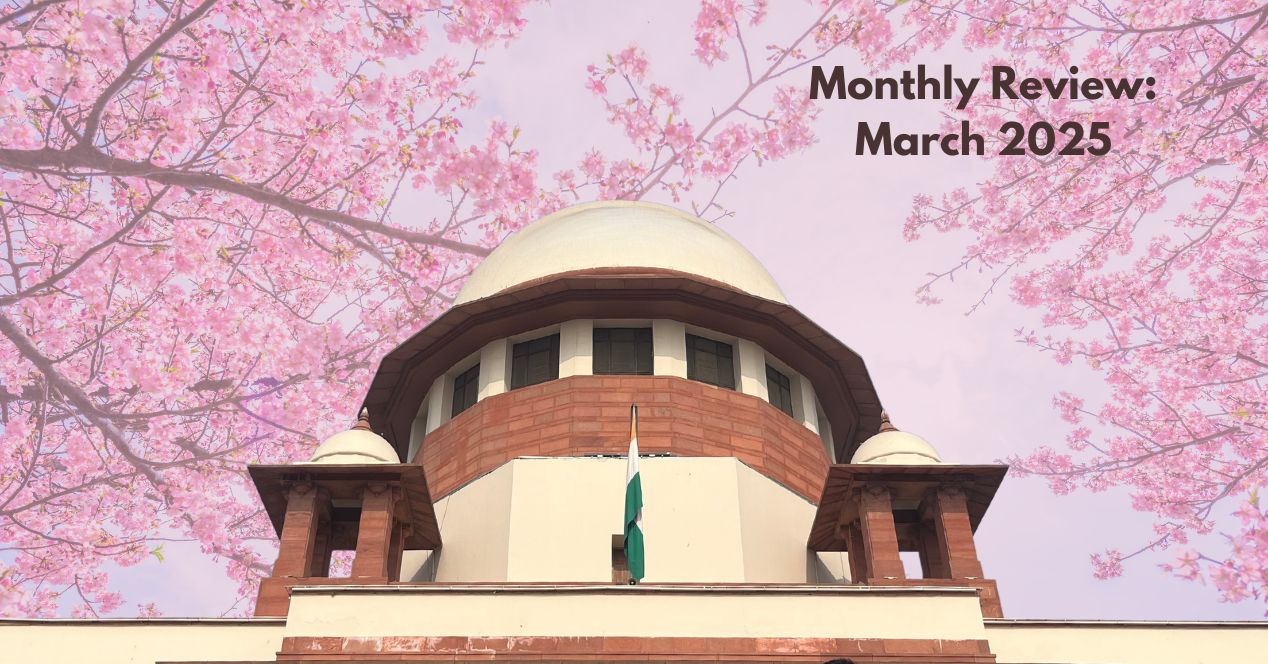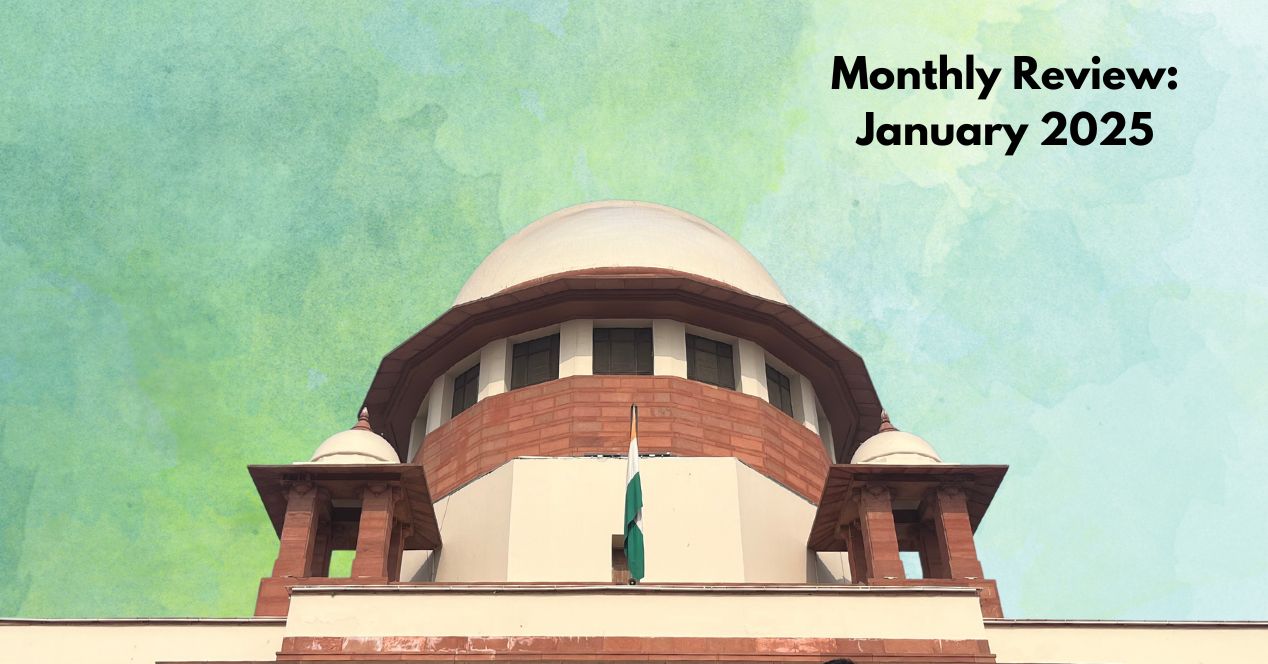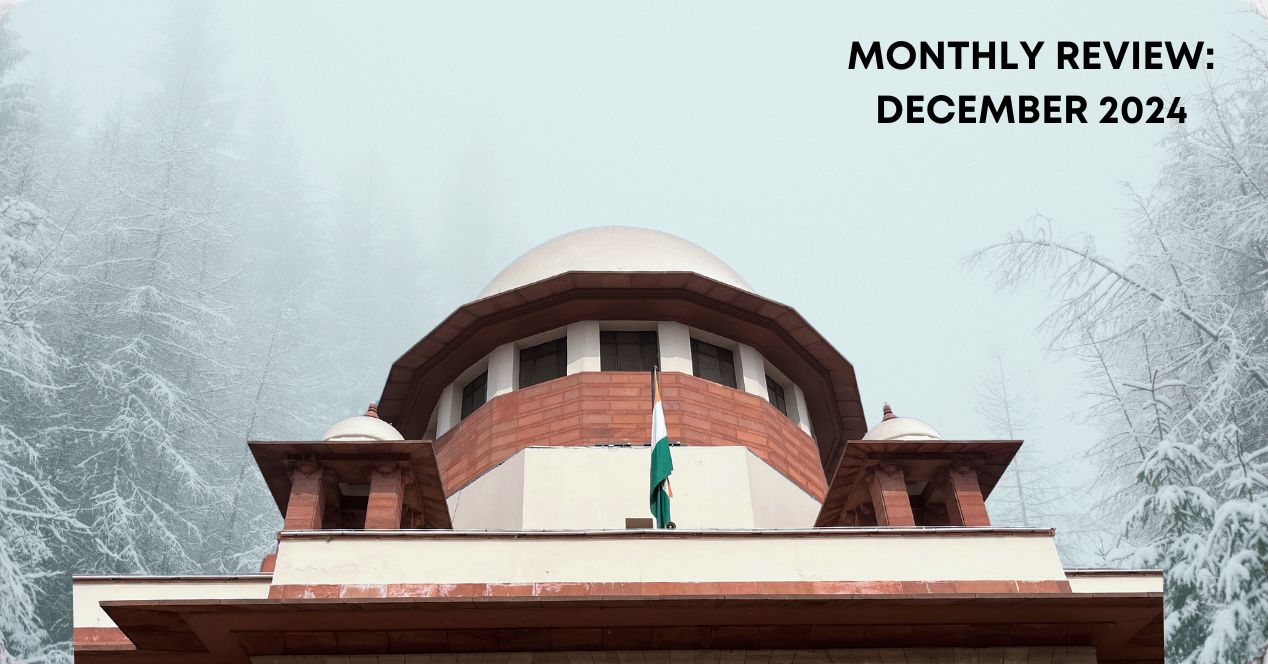Analysis
Monthly Review: April 2025
Transparency moves, pollution enforcement, Governor’s powers tested, and a key arbitration judgment shaped April at the Supreme Court

April was one of those stretches where the law didn’t just respond to events, it wrestled with them. Judges resolved to release their asset declarations for the first time in years. The Court took up challenges to the Waqf Amendment Act, 2025, prompting one of the largest public turnouts for a virtual hearing in recent memory. It passed critical orders on the pollution crisis in Delhi-NCR and a Constitution Bench decided how far courts can go in modifying arbitral awards.
This monthly review dives into these cases and developments, unpacking key Supreme Court decisions and developments from April 2025.
Courts can tweak arbitral awards
On 30 April, a five-judge Constitution Bench delivered a landmark judgment in Gayatri Balasamy v ISG Novasoft Technologies. In a 4:1 majority, the Bench held that courts have a “limited” power to modify arbitral awards under Sections 34 and 37 of the Arbitration Act, 1996.. The majority reasoned that this power is inherent in the court’s authority to set aside awards and is necessary to prevent undue hardship, unnecessary delays and additional costs. However, they emphasised that modification is not equivalent to an appeal.
The majority also upheld courts’ discretion to modify post-award interest and cautioned against routine remands. Further, they upheld the Supreme Court’s power under Article 142 to modify awards. Justice K.V. Viswanathan dissented, warning that such intervention could undermine the Act’s goal of minimal judicial interference and affect international enforcement.
To aid your understanding, we provide a concise summary of the judgement here. Also see our Judgment Matrix, Arguments Matrix, and the hearing reports for Days 1, 2 and 3.
A timeline for the governor
On 8 April 2025, a Supreme Court Division Bench struck down Tamil Nadu Governor R.N. Ravi’s prolonged withholding of assent to ten state legislature bills as illegal. The Bench held that under Article 200 of the Constitution, the Governor must either grant assent, return the bill for reconsideration, or reserve it for the President. He cannot withhold assent indefinitely or exercise an absolute veto. Further, the Bench of Justices J.B. Pardiwala and R. Mahadevan also prescribed clear timelines for both the Governor and President to decide on bills, and stated that non-compliance would be subject to judicial review. Using its powers under Article 142, the Court deemed the pending bills as having received assent, invalidating any subsequent Presidential rejection.
The judgement provoked sharp criticism from Vice President Jagdeep Dhankhar, who accused the Court of overstepping constitutional limits and undermining democratic institutions. For a concise understanding we summarised the judgement. Our judgement matrix give a snapshot of the arguments and the decision.
Waqf stirs debate
On 16 April 2025, Chief Justice Sanjiv Khanna’s Bench began hearing challenges to the constitutional validity of the Waqf (Amendment) Act, 2025. The hearing drew exceptional public interest, with over a thousand participants joining the Court’s virtual proceedings, a turnout rarely seen outside landmark cases. Petitioners argued that the amendments infringe on Muslim religious rights by allowing non-Muslims to sit in the majority on administrative boards. The petitions also contested the deletion of ‘waqf by user’, which applies to more than half of India’s 8 lakh waqfs.
Senior Advocate Kapil Sibal described the amendment as a “parliamentary usurpation of the faith of 200 million persons,” highlighting the impracticality of requiring deeds for waqfs centuries old. Solicitor General Tushar Mehta countered that registered ‘waqf by user’ properties would remain unaffected, emphasising the responsibility of custodians for past non-registration. The Union was given seven days to respond, while the Court deferred substantive constitutional issues to a later date, scheduling the next hearing for early May.
In May, the Supreme Court rejected contempt proceedings against BJP MP Nishikant Dubey for publicly accusing CJI Sanjiv Khanna of causing civil wars, stating that such comments do not always warrant punishment. While dismissing the plea, the Khanna-led Bench retorted that “courts are not as fragile as flowers.”
As of 22 May 2025, the Supreme Court has reserved judgement in a batch of petitions seeking an interim stay on the Act.
Delhi pollution, still toxic
On 8–9 April 2025, the Supreme Court reviewed Delhi-NCR’s solid waste and vehicular pollution control efforts. While praising the Municipal Corporation of Delhi for resolving over 8 lakh complaints and issuing 2,000+ fines, the Court stressed urgent mass awareness campaigns and ordered improved compliance reporting by 30 June. It also addressed gaps in implementing High Security Registration Plates and fuel-type stickers.
On 24 April 2025, the Court highlighted deeper issues, including 134 vacancies in the Central Pollution Control Board, underuse of 30% of National Clean Air Programme funds, and frequent staff transfers harming expertise. Senior Advocate Aparajita Singh stressed the lack of political will, not laws, as the core problem. The Court mandated quarterly enforcement reports, a real-time air quality portal within a month, senior nodal officers for waste management, and strict penalties to boost transparency and accountability.
Ranveer gets his pass
On 28 April, the Supreme Court allowed YouTuber Ranveer Allahbadia to reclaim his passport, clearing the way for international travel. In February, the Court had directed him to surrender it amid ongoing investigations in Assam and Maharashtra over allegations of obscenity on comedian Samay Raina’s show India’s Got Latent. With both states now having concluded their investigations, the Court permitted the Maharashtra Cyber Crime Bureau to release the passport on reasonable terms.
Earlier, during a hearing on 21 April, the Court had deferred Allahbadia’s passport application while addressing concerns raised by his counsel about repetitive questioning and adverse media coverage affecting his reputation and livelihood. Advocate Abhinav Chandrachud emphasised the necessity of Allahbadia’s need to travel for work commitments. The Court also noted ongoing investigations and accepted Solicitor General Tushar Mehta’s assurance that they would conclude shortly.
Balaji’s bail balancing act
On 20 April, the Supreme Court dismissed a plea seeking cancellation of bail granted to DMK Minister Senthil Balaji in September 2024. Balaji is charged under the Prevention of Money Laundering Act, 2002 for his alleged role in a cash-for-jobs scam during his tenure as Transport Minister in the AIADMK government. He was arrested by the ED in June 2023 and granted bail due to likely delays in trial, not on the merits of the case.
The cancellation plea was prompted by Balaji’s reinduction into the Tamil Nadu cabinet shortly after securing bail, raising concerns that he could influence witnesses. On 23 April, the Bench found this apprehension valid and presented Balaji with Hobson’s choice: either remain a Minister and risk losing his bail, or resign and retain his liberty. He resigned on 27 April, a day before the next hearing.
Judges show their cards
In a notable step towards greater transparency, Supreme Court judges decided in a full court meeting on 1 April to publicly declare their assets. This move came amid ongoing concerns over judicial accountability, especially following the cash seizure at Justice Yashwant Varma’s residence. Judicial asset declaration had long been a contentious issue. Since 1997, judges have disclosed assets only to the Chief Justice, with voluntary public disclosures beginning around 2009.
While no official announcement was made, the Court disclosed the asset statements of 21 out of 33 sitting judges on 5 May and promised to release the rest soon.
Court in a nutshell
Since 2017, our comprehensive Case Archive has documented all landmark cases with detailed reports and analyses.
In April, we published four issues of the Supreme Court Observer Law Reports (SCO.LR), each highlighting five significant Supreme Court judgments of the week.
Now, with SCO.LR, we offer readers concise, accessible summaries of the most important rulings every week. Be sure to check out our April issues and stay updated with the key developments at the Supreme Court of India!
Read our April issues here: Issue 1, Issue 2, Issue 3, Issue 4.




